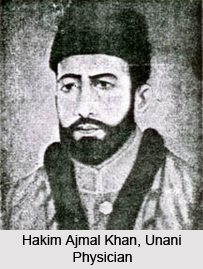 India became famous for the development and progress of Unani medicine during the Medieval Ages in India. Lucknow, Delhi, Hyderabad, Jaipur and Lahore were among the great centres of this field of learning which have produced renowned families of physicians in India. These families were directly or indirectly connected with the famous physicians of Shiraz and Gilan in Iran. They have left important medical literature for the future generations. It is an undisputed fact that their wonderful skill in medicine not only endeared them to the Indian masses but also earned for them utmost respect and honour from the ruling monarchs and nobles of the period. Two of these distinguished and renowned families, can still be identified through the descendants of the Sharifi Family and the Azizi Family.
India became famous for the development and progress of Unani medicine during the Medieval Ages in India. Lucknow, Delhi, Hyderabad, Jaipur and Lahore were among the great centres of this field of learning which have produced renowned families of physicians in India. These families were directly or indirectly connected with the famous physicians of Shiraz and Gilan in Iran. They have left important medical literature for the future generations. It is an undisputed fact that their wonderful skill in medicine not only endeared them to the Indian masses but also earned for them utmost respect and honour from the ruling monarchs and nobles of the period. Two of these distinguished and renowned families, can still be identified through the descendants of the Sharifi Family and the Azizi Family.
Contributions of Sharifi Family to Unani Medicine in India
Sharifi family benefited greatly from the physicians of Shiraz, both before and after the establishment of the Mughal Empire in India. The family traces its descent from Hajrat Khwajah Abdullah Ahrar (15th century), a Sufi saint, who lived in Samarqand during the reign of Tamerlane. He was succeeded by his son Khwajah Muhammad Abdullah known as "Khwajah Kalan" or the "Great Khwajah". In Samarqand, the family was known as the "Family of Mystics" or the "Men of God". When Babur invaded India in 1526 AD, he brought with him Khwajah Muhammad Yusuf, son of Khwajah Kalan, simply to have the blessings of that holy man which might lead him to victory.
His two brothers by the name of Hakim Khwajah Khawand Mahmud and Khwajah Abdul Shahid also came to India. Hakim Khwajah Khawand Mahmud attained great fame as a physician during the reign of Emperor Humayun. In his early life, the Hakim had gone from Samarqand to Shiraz where he learnt medicine from the famous Shirazi physician Hakim Imad al-Din Shirazi.
Two great men were born in the 7th or 8th generation of Khwajah Muhammad Yusuf by the names of Mulla Ali Qari and Mulla Ali Dawud. Fadil Khan the only son of the said Mulla Dawud was the first member of this family to select medicine as his profession and to attain fame in this field. His son Wasil Khan was also a famous Hakim who came from Agra to Delhi at the invitation of Aurangzeb (1658-1707) and then settled down in the capital. He was an able physician.
Wasil Khan had two sons named Ajmal Khan I and Akmal Khan who after the death of their father, learnt Unani medicine from the famous Shirazi physician Hakim Alawi Khan who was deputed to this job by the emperor. As a result of the kind treatment and keenness of the teacher, those two brothers rose as two luminaries on the horizon of the Unani medicine during the reign of Emperor Muhammad Shah (1719-1748).
Hakim Muhammad Sharif Khan: He was born in Delhi in the year 1722 AD. Apart from gaining expertise in Unani medicine, Hakim Sharif Khan had also made an in-depth study of Ayurveda and has listed Ayurvedic drugs and Indian diets in his books, "TaliJ-i Sharifi" and "Tohfah-i Alam Shahl". He included several compound medical preparations of Ayurveda and Dhatu Vasmas in Unani medicine practised by him. He also enriched Unani medicines with other indigenous herbs. This shows his far-sightedness and love for learning without any prejudices.
Hakim Sharif Khan was regarded as one of the most learned and successful physicians during the reign of Emperor Muhammad Shah. He was not only a leading physician of his time but also a prolific writer. He has written invaluable books on Unani medicine, commentaries and notes on important medical works which are given below:
(i) Hashiyah Sharh al-Asbab wal Alamat
(ii)Hashiyah Kulliyat-i Nafisi
(iii) Ilaj al-Amrad
(iv) Fawaid-i Sharifiyah
(v) Talif-i Sharifi
(vi) Sharh-i Hummiyat-i Qanun-i Farsi
(vii) Hashiyah-i Qanun
(viii) Sharh-i Mujiz
(ix) Madarik al-Hikam
(x) Tohfah-i Alam Shahi
Hakim Sadiq Ali Khan: Hakim Sharif Khan was succeeded by his son Hakim Sadiq Ali Khan who, by his ability and skill in medicine, kept up the name and prestige of the Sharifi family in the medical field. Hakim Sadiq Ali maintained good relations with Mughal kings who had granted him a "Jagir" in recognition of his services to medicine, which was confiscated by the British Government in 1857.
Related Articles
Indian Naturopathy
Unani Medicine in India
Unani Medicine in Medieval Age
Unani Medicine during Mughal Period
Development of Unani Medicine during Emperor Babur
Development of Unani Medicine during Humayun
Development of Unani Medicine during Emperor Aurangzeb
Development of Unani Medicine during Emperor Muhammad Shah




















